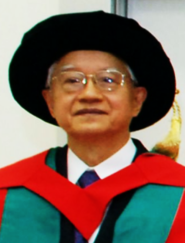

Born in Nanjing in 1930, Wu Jing Lian graduated from the Department of Economics at Shanghai’s Fudan University. His excellence as an undergraduate won him a place as researcher in the Chinese Academy of Social Science immediately after graduation. For thirty years, he ploughed the furrow of research at the Academy, helping to plan, guide, and direct national economic policy.
Wu Jing Lian’s early training was in command economics. He studied enterprise finance in the context of national finance with an eminent Russian economist, and contributed to nation-wide studies of structural reform. Right from the start, he was committed to development and reform that would alleviate poverty and bring relief to the destitute. It is this belief in a just society which drives his research, and the different economic models he analysed so assiduously throughout his life are but means to an ethical end.
Like many intellectuals of his generation, the experience of the Cultural Revolution was a decisive turning point for Wu Jing Lian. As the nation plunged into political turmoil, he also saw how its economic structure, which he had helped to build, began to fracture. This led him to reflect seriously on the ideological flaws of a totally state-driven economy. He soon realized that his own knowledge was inadequate to produce the intellectual breakthrough that would generate a new economic model for China. In order to relearn the past, he read voraciously about world history; his reading ranges beyond economics to the histories of politics, religion, and culture. For Wu Jing Lian, the Cultural Revolution was a period of personal constraint but also one of intellectual emancipation.
In the early nineteen eighties, he travelled to the west, to visit and conduct research at Yale University, Stanford University, the Massachusetts Institute of Technology, and Oxford University. In a number of ground-breaking publications, he compared the characteristics of planned and commodity economies, drawing from both those elements of strength in order to develop the concept of a socialist market economy. He contributed to establishing the theoretical foundations of a market economy in China, especially in the areas of self-financed enterprises, competitive market systems, and macroeconomic control. What distinguishes Wu Jing Lian as an economic thinker and planner is his refusal of theoretical and ideological rigidity. His close attentiveness to rapidly changing economic conditions and market trends enables him to devise policies that would mobilize changes, but also shape and regulate them as they occur.
Thomas Carlyle called economics “the dismal science”, but Professor Wu’s work has been neither pessimistic nor dull. For his pioneering and outspoken views, he has been criticized as an advocate of “liberalism”. This never deflected him from his stringent criticism of those sections of society which put the protection of their vested interests above the common good, and whose corrupt manipulations of commodity supply and distribution, and land sales obstruct market reform and the setting up of a modern enterprise system. Professor Wu is not just a distinguished economic thinker; he embodies the finest virtues of a public intellectual - boldness of rhetoric, integrity of character, courageous commitment to the righting of social wrongs.
In his capacity as Professorial supervisor of doctoral candidates at the Graduate School of the Chinese Academy of Social Sciences, Wu Jing Lian has trained a whole generation of advocates of market reform, many of whom are now in highly-placed official and unofficial positions. He was highly influential as executive member of the standing committee of the Development Research Centre of the State Council, of which he is now Research Fellow, and as Deputy Director of the State Council’s Office for Economic Reform. His influence is further disseminated through his work as Chief Editor of the widely-read economic journal, Reform (Gaige). He has also held industry appointments including Chief Economist of China International Capital Company Ltd, and Director, China Petroleum Company Ltd. Professor Wu’s contributions to China were recognized in his election as a recipient of the prestigious China Economics Award in 2004. This national honour is complemented by the International Academy of Management’s Distinguished Achievement Award presented to Professor Wu in the same year.
In a short memoir published in 2003, Professor Wu has this to say: "I think an economist’s professional status and the way he writes are not the correct measures of his social contribution. As long as he holds fast to what should be natural to an intellectual, that is, to an independence of position and a critical attitude, then no matter if he is inside or outside the establishment, expressing himself through academic publications or policy advice, he can still have an effect on mobilizing social progress. In a pluralistic society, one should be tolerant like the sea that can accommodate a hundred rivers, and magnanimous to achieve the spirit of grandeur".
Mr Chancellor, a nation can be understood in different ways. Professor Wu has devoted his life to understanding China as a network – a vast and dynamic complex of relationships of work, resources, production and consumption, commodities and communications, institutions and systems. But a nation can also be understood through narrative, and the story of Professor Wu’s own life and career, its struggles and setbacks as well as its achievements and discoveries, can tell us much about modern China. His story can serve as something of an allegory of the evolution of the country, the problems it has faced and the directions it has chosen, on its path towards becoming a nation of the twenty-first century.
Mr Chancellor, for his contribution to the nation, it is my honour and privilege to present Wu Jing Lian for the award of the Degree of Doctor of Social Sciences honoris causa.
Citation written and delivered by Dr Elaine Ho Yee Lin, the Public Orator.



